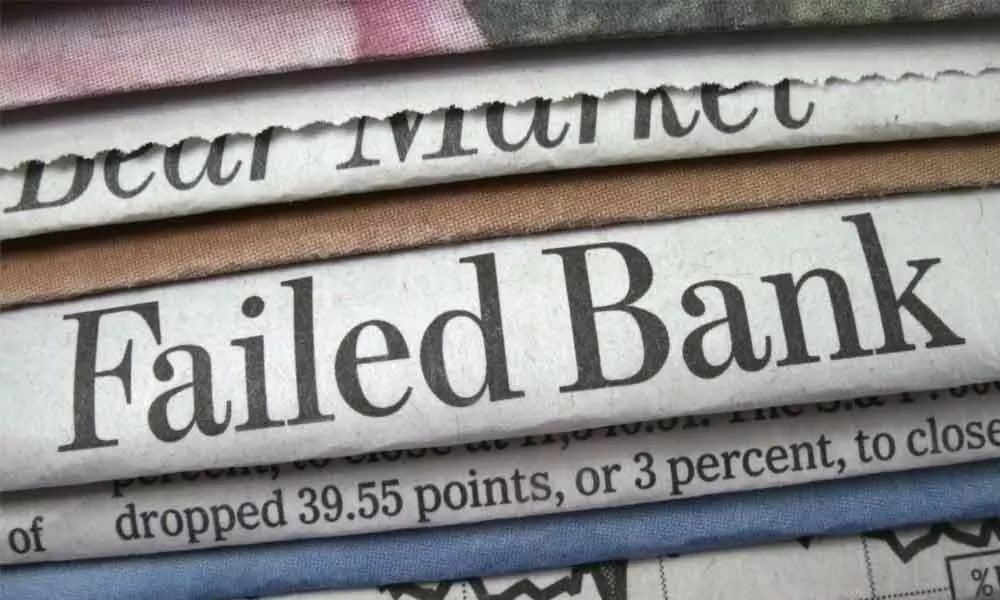What happens to your money if a bank fails?
Depositors of failed or stressed banks are placed under a moratorium to get their deposits up to `5 lakh back within ninety days of the start of the moratorium
image for illustrative purpose

Are Small Finance Banks covered under Deposit Insurance? Do banks charge insurance premiums on deposits to customers? Mahender Reddy, Wanaparthy
Irrespective of the size and status of the bank customers, fixed deposits are safe in all Scheduled banks, including Small Finance Banks. Your deposit is insured in a bank up to a maximum of Rs 5 lakhs for both principal and interest amount. The insurance is covered as on the date of a bank failing, liquidation, and the cancellation of the bank's licence. The cover is valid in case of a financial scam or closure of a bank, or any unlikely event.
The insurance covers and is valid when the merger, amalgamation or reconstruction comes into force. Each bank depositor in India has a claim to a maximum of Rs 5 lakh per account as insurance cover. The Deposit Insurance and Credit Guarantee Corporation (DICGC), a subsidiary of the Reserve Bank of India, provides the cover of Rs 5 lakh per depositor. Before 2020, cooperative banks were not included under DICGC coverage. Blissfully, in 2020 the government of India introduced an amendment in the Banking Regulation Act, and RBI was given complete regulatory control over cooperative banks.
All banks, including cooperative banks, were now put under deposit insurance coverage. Earlier, the insurance cover for depositors provided by the DICGC had been capped at Rs 1 lakh. Thankfully, the coverage has been raised five times, from Rs 1 lakh to Rs 5 lakh. This reform proved to be a great relief for the bank customers, and this crucial initiative boosted morale and increased the depositors' confidence. Accordingly, banks have to pay the premium.
Depositors need not pay the premium for the DICGC cover. Banks pay for the DICGC coverage Rs 12 paisa per Rs 100 deposit. Depositors of failed or stressed banks are placed under a moratorium to get their deposits up to Rs 5 lakh back within ninety days of the start of the moratorium. The stressed bank will collate all data, including the number of claimants and claim amount and inform DICGC about it within the first forty-five days. DICGC will process the claim and pay each eligible depositor within the next forty-five days.
Hence, the ninety days will be divided into two parts. The customers will be able to get up to Rs five lakh deposit insurance amount back under the deposit insurance scheme of the DICGC. All customers who keep deposits are insured under the 'Deposit Insurance and Credit Guarantee Corporation Act 1961. Every customer is protected against risk and loss to principal and interest under the DICGC. Customers get protection or cover on all deposits, including term, fixed, current, recurring deposits.
Why sugar manufacturing companies doing good in the stock market? Is it a good time to invest in sugar stocks? C S Mithun, Bangalore
Sugar stocks have delivered a decent performance over the last year. The government of India's ethanol blending policy brought back the sweetness for sugar stocks. Last year the government revised the deadline from 2025 to 2023 for 20 per cent ethanol blending with petrol. Ethanol is a sugar mill's byproduct that is used as an alternative fuel. The government of India has also set the ambitious goal to have 100 per cent ethanol-run vehicles. Various auto manufacturing companies are preparing to run vehicles on ethanol and petrol combined with ethanol. The sugar industry in India has struggled with excess production and low demand.
However, the increased demand and rising prices in the international market helped the sugar industry and generated excitement in investors. The rising demand for ethanol was a shot in the arm and changed the sugar sector's outlook. India is the second-largest sugar producer after Brazil. Sugar production in Brazil, international sugar demand and prices, and the domestic market also could impact the Indian sugar industry apart from the fundamentals of a manufacturing company. These developments have positively impacted sugar stocks and relieved the struggling sugar companies. Sugar producing companies are exposed to various risks from climatic conditions, production and demand in international markets, government policies. The sugar industry in India is highly relegated. India's annual sugar production in the past decade exceeded domestic consumption.
Slowly and steadily, the sugar industry dismisses its cyclical nature and carry a positive future vision due to various factors. Sugar companies may offer short-term trading opportunities and deliver handsome gains. Some multi-bagger sugar stocks delivered a 400 per cent return in a year. At this juncture, the sugar stocks are riding high on ethanol optimism. Investors may get to witness the rally and strong growth trajectory in the next two years. Sugar is a cyclical industry, and sugar-producing companies should not be seen as wealth-creating stocks.
(The author is a SEBI licensed Research Analyst. The alumnus of the Indian Institute of Foreign Trade (IIFT), he had held leadership roles at National Geographic, Reliance Radio Television Luxembourg, STAR TV, etc)

